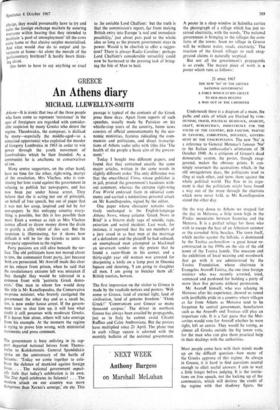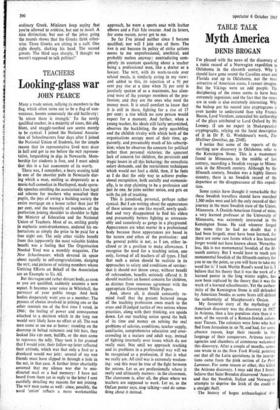An Athens diary
GREECE MICHAEL LLEWELLYN-SMITH
Athens—It is ironic that two of the three people who have come to represent 'resistance' in the eyes of foreigners are regarded with consider- able suspicion by many Greeks who detest the regime. Theodorakis, the composer, is disliked by many—especially the middle-aged—as a conceited opportunist who exploited the murder of Gregory Lambrakis in 1963 in order to win power through the youth movement of Lambrakides which he then founded. As a communist he is anathema to conservatives Of ERE.
Many centre supporters, on the other hand, have no time for the other, right-wing, martyr of the revolution, Mrs Vlachos, who is con- tinuing her lone stand against the government in refusing to publish her newspapers, and has now been put under house arrest. They believe that she is acting-not out of principle, on behalf of free speech, but out of pique that it was not her coup, inspired and led by her newspapers. In this unhappy country every- thing is possible, but this is less possible than most. Even a woman as rich as Mrs Vlachos cannot afford to throw money down the drain to gratify a silly whim of this sort. But the suspicion is illuminating, for it shows how difficult it will be for the Greeks to unite in non-party upposition to the regime.
Party passions are still alive beneath the sur- face. The old politicians have not moved closer to EDA, the communist front party, just because both are' ersecuted. Mr Averoff made this clear on his release from prison, when he said that the revolutionary extreme left was mistaken if they thought they would be tolerated in a common front with 'patriotic Greek demo- crats. One man to whom few would deny this title is Mr Kanellopoulos, the Conservative ex-prime minister, who bravely castigated the government the other day and as a result he, too, is now under house arrest. If the govern- ment tries to shut him up, it will lose what credit it still possesses with moderate Greeks. If it leaves him alone, others will take courage from his example. At the moment the regime is trying to prove him wrong, with ministerial statements and press comment.
The government is busy, enlisting in its sup- Port departed national heroes from Themis- tocles to Kolokotronis. General Spandidakis spoke on the anniversary of the battle of Salamis: 'Today we come together to cele- brate the defence of mankind against foreign force. . . . The national government especi- ally feels that today's celebration is its own. The 21st April celebrates its Salamis! . . . The modern attack on our country was more dangerous than Xerxes's scourge,' etc etc. This
passage is typical of the contents of the Greek press these days. Apart from reports of such speeches, usually made by Pattakos on his whistle-stop tours of the country, home news consists of official announcements by the- eco- nomic ministries, features ridiculing the com- munists and politicians, and direct transcrip- tions of Athens radio talks with titles like 'The health of the people a basic aim of the govern- ment.'
Today I bought two different papers, and found that they contained exactly the same major articles, written in the same words in slightly different order.-The only difference was that the once-liberal Vima, whose publisher is in jail, printed the government's handouts with- out comment, whereas the extreme right-wing Free World endorsed them in editorial com- ments and carried a tendentious personal attack on Mr Kanellopoulos, signed by the editor.
One paper whose character remains rela- tively unchanged is the English-language Athens News, whose column 'Greek News in Brief' is a bizarre daily saga of suicide, rape, extortion and weird incident. Last week, for instance, it reported that the ten members of a jury stood in as best men at the marriage of a defendant and the plaintiff he had seduced; an unemployed man attempted to blackmail an ice-cream vendor on the pretext that he found a razor-blade in his cornet; and a thirty-eight year old woman was arrested for sharpening a knife on a lamp post in Omonia Square and shouting, 'I am going to slaughter all men, I am going to butcher them all.' British tourists, beware.
The first impression on the visitor to Greece is made by the roadside notices and posters. 'Wel- come to Greece, land of eternal light, land of Civilisation, land of genuine freedom.' Think Greek!' Communism cost Greece so many thousand corpses.' The driver in northern Greece has always been assailed by propaganda, just as in Italy he cannot avoid Chianti Ruffin and Calze Ambrosiana. But the posters have multiplied since -21 April. The plane tree in each village square is adorned with the monthly bulletin of the national government. A poster in a shop window in Salonika carries the photograph of a village which has just re- ceived electricity, with the words, 'The national government is bringing to the villages the com- forts of the towns. Soon no village in Greece will be without water, roads, electricity.' The reaction of the Greek villager to such exag- gerated claims is naturally sceptical.
But not all the government's propaganda is so crude. The neatest piece of work is a poster which runs as follows: 21 APRIL 1967 THE NEW 'NO' OF THE GREEKS NATIONAL GOVERNMENT A FORCE WHICH LEADS GREECE TO HER HIGH DESTINY A WAY OUT OF THE LABYRINTH
Underneath there is a diagram of a maze, the paths and exits of which are blocked by Cow MUNISM, FRAUD, POLITICAL DEADLOCK, ANARCHY, GRAFT, BUREAUCRACY, INDIFFERENCE FOR THE YOUTH OF THE COUNTRY, RED FASCISM, TRAFFIC IN FAVOURS, CORRUPTION, INJUSTICE, GOVERN- MENT BY THE UNSCRUPULOUS. The new 'No' is a reference to General Metaxas's famous 'No' .to the Italian ambassador's ultimatum of 28 October 1940. As a criticism of Greece's dead democratic system, the poster, though exag- gerated, makes the obvious points. It cun- ningly resurrects the accusations which, in the old unregenerate days, the politicians used to sling at each other, 'and turns them against the
whole political world. The flaw in its argu- ment is that the politicians might have found a way out of the maze through the elections which were never held, as Mr Kanellopoulos stated the other day.
On the way down to Athens we stopped for the day in Metsovo, a little town high in the Pindus mountains between Ioannina and the Meteora. It is a perfect refuge for those who wish to escape the heat of an Athenian summer or the crowded Attic beaches. The town itself, which nestles against the hillside, is dominated by the Tositsa archontikon—a great house re- constructed in the 1950s on the site of the old home of the Tositsa family. The museum and the exhibition of local weaving and woodwork that go with it are administered by the Tositsa Foundation, whose chairman is Evangelos Averoff-Tositsa, the one time foreign minister who was recently arrested, tried, sentenced and pardoned for holding a party of more than five persons without permission.
Mr Averoff himself, who was relaxing in Metsovo after his experience, showed us round with justifiable pride in a country where villages as far from Athens as Metsovo tend to be forgotten by central government, benefactors such as the Averoffs and Tositsas still play an important role. It is a fair guess that the Met- sovites would vote for Averoff whether he were right, left or centre. They would be voting, as almost all Greeks outside the big towns vote, for the man who can give them practical help in their dealings with the authorities.
Most people come here with their minds made up on the difficult question—how many of the Greeks approve of this regime. As always in Greece, it is hard to find questions neutral enough to elicit useful answers. I aim to wait a little longer before judging. It is the restric- tions on free speech, not the locking up of the communists, which will destroy the credit of the regime with that shadowy figure, the'
ordinary Greek. Ministers keep saying that you're allowed to criticise, but not to insult. A nice distinction; but one of the jokes going the rounds shows that the Greeks think other- wise. Three Greeks are sitting in a café. One sighs deeply, shaking his head. The second groans. The third says sharply, 'I thought we weren't supposed to talk politics!'



































 Previous page
Previous page